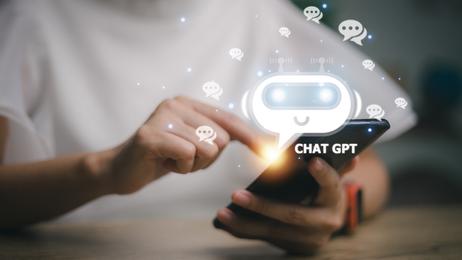Artificial Intelligence has been around for many years. But it's recently gotten much media attention because of an AI application called ChatGPT. ChatGPT is one of several AI apps that OpenAI has developed. Let's explore ChatGPT and find out how it can help you plan your studies at a community college.
To show you how ChatGPT can work as a resource, I submitted the following questions to ChatGTP. ChatGPT's answers are in blockquotes. These questions and answers will show you the power of this remarkable new tool. Note that I use the word "tool" to describe ChatGPT. Its database is the entire Internet through 2021. It is speedy, powerful, and generally accurate. You may be tempted to have it write your papers, answer quizzes, and do other homework tasks. But don't be tempted. Your work and the thinking behind your work are unique. Only submit work that is yours with proper attribution. Claiming that you wrote something somebody else or ChatGPT wrote is cheating. It's unethical and will get you into trouble with your college instructors.
This video offers a crash course on ChatGPT.
I want to take an online course at my local community college. Which is better, online learning or in-person learning?
That really depends on your individual learning style and preferences. Online learning can be great because it allows you to work at your own pace and can be more convenient; however, some people find it more difficult to stay motivated and engaged when learning online. In person learning can be more engaging and interactive, but can be more time consuming. Ultimately, it is up to you to decide which learning format would work best for you.
How can ChatGPT help community college students who are studying automotive systems technology?
ChatGPT can help community college students studying automotive systems technology by providing a variety of resources, such as tutorials and practical examples. ChatGPT can also provide personalized advice and support, giving students the opportunity to ask questions and receive answers from experts. Additionally, ChatGPT can provide access to a wide range of online resources and information about the automotive industry, including industry news, trends and developments.
I want to work in health sciences. What is Electroneurodiagnostic Technology and what's involved in learning that discipline?
Electroneurodiagnostic (END) Technology is a specialized medical field that focuses on the diagnosis of neurological diseases and disorders through the use of electrical recordings of the brain, nerves, and muscles. END Technologists use specialized equipment to measure, analyze, and interpret electrical signals in the brain and nervous system. The goal of END Technology is to provide accurate and timely diagnosis to help treat and manage patients with neurological problems. To become an END Technologist, individuals must complete a course of study that includes both classroom and clinical experiences. This typically includes instruction in anatomy and physiology, medical terminology, and clinical practice. END Technologists must also possess strong problem-solving and communication skills.
This video shows you how to use ChatGPT for research.
I'm good with my hands but not so good with academics. Will that be an obstacle to my learning how to become a facilities maintenance technologist?
Yes, it could be an obstacle. While the technical knowledge required to become a facilities maintenance technologist can be learned on the job or through a trade school, most employers prefer to see a combination of hands-on experience and a formal education in the field. If you are not academically inclined, you may need to focus on gaining experience in the field before attempting to pursue a more formal education.
I am in my 40s. I need to make a career change. Can the staff at my community college help me make the right decisions?
Yes! Many community colleges offer career counseling and career development services that can help you make the right decisions for your career change. You can work with experienced counselors to explore your interests, identify potential career paths, and create an action plan to help you reach your goals. You may also be able to work with a job placement specialist to find job openings in your chosen field.
English is not my first language. Explain courses in English Language Acquisition or ELA to me.
ELA, or English Language Acquisition, is a type of course designed to help students learn and improve their English language skills. These courses cover a wide range of topics, including grammar, vocabulary, pronunciation, reading, writing, and speaking. They also focus on developing an understanding of English culture, history, and literature. Depending on the course, students may also learn about different dialects, accents, and regional variations of English. The goal of most ELA courses is to enable students to communicate effectively in English.
How does dual enrollment for high school students work at community college?
Dual enrollment for high school students at community colleges typically works by allowing high school students to take college courses for college credit alongside their high school courses. These courses are often offered for free or at a discounted rate, depending on the college and student's eligibility. High school students who participate in dual enrollment may be able to graduate from high school with college credits that can often be transferred to a four-year college or university. In some cases, dual enrollment can even allow high school students to graduate with an associate degree.
What kind of financial aid is there for students at a community college?
Financial aid for students at a community college includes grants, scholarships, loans, and work-study programs. Grants and scholarships are typically need- or merit-based and do not need to be repaid; loans must be repaid with interest; and work-study programs provide students with part-time employment to earn money to help pay for college.
As you can see, there are few limits on what you can ask ChatGPT. She can be your mentor, your guide, your research assistant, or a reference library and your advisor. Try it out.
Questions? Contact us on Facebook. @communitycollegereview















